
Slide guitar is a technique for playing the guitar that is often used in blues music. It involves playing a guitar while holding a hard object against the strings, creating the opportunity for glissando effects and deep vibratos that reflect characteristics of the human singing voice. It typically involves playing the guitar in the traditional position with the use of a slide fitted on one of the guitarist's fingers. The slide may be a metal or glass tube, such as the neck of a bottle. The term bottleneck was historically used to describe this type of playing. The strings are typically plucked while the slide is moved over the strings to change the pitch. The guitar may also be placed on the player's lap and played with a hand-held bar.
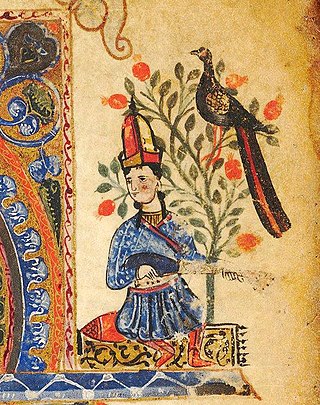
The music of Armenia has its origins in the Armenian highlands, dating back to the 3rd millennium BCE, and is a long-standing musical tradition that encompasses diverse secular and religious, or sacred, music. Folk music was notably collected and transcribed by Komitas Vardapet, a prominent composer and musicologist, in the late nineteenth and early twentieth centuries, who is also considered the founder of the modern Armenian national school of music. Armenian music has been presented internationally by numerous artists, such as composers Aram Khachaturian, Alexander Arutiunian, Arno Babajanian, Haig Gudenian, and Karen Kavaleryan as well as by traditional performers such as duduk player Djivan Gasparyan.
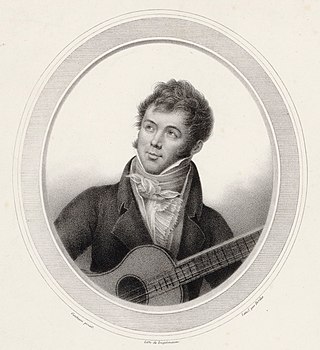
Fernando Sor was a Spanish classical guitarist and composer of the early Romantic era. Best known for writing solo classical guitar music, he also composed an opera, three symphonies, guitar duos, piano music, songs, a Mass, and at least two successful ballets: Cinderella, which received over one hundred performances, and Hercule et Omphale.

The duduk or tsiranapogh, is a double reed woodwind instrument made of apricot wood originating from Armenia. Variations of the Armenian duduk appear throughout the Caucasus and the Middle East, including Azerbaijan, Georgia, Kurdistan, Russia, Turkey, and Iran. Duduk, Balaban, and Mey are almost identical, except for historical and geographical differences.

Roland Dyens was a French classical guitarist, composer, and arranger.

Derek Sherinian is an American keyboardist who has toured and recorded for Alice Cooper, Billy Idol, and Joe Bonamassa, among others. He was also a member of Dream Theater from 1994 to 1999, is the founder of Planet X and also one of the founding members of Black Country Communion and Sons of Apollo. He has released nine solo albums that have featured a variety of prominent guest musicians, including guitarists Slash, Yngwie Malmsteen, Allan Holdsworth, Steve Lukather, Joe Bonamassa, Michael Schenker, Steve Vai and Al Di Meola.
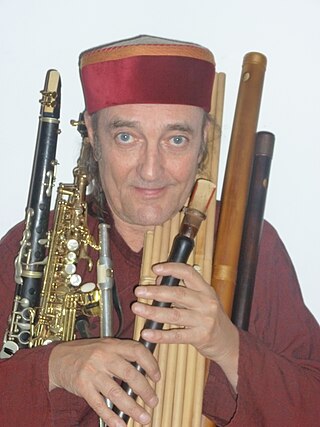
Didier Malherbe, is a French jazz, rock and world music musician, known as a member of the bands Gong and Hadouk, as well as a poet.

Jean-Pierre Danel is a French guitarist, record producer, music writer, and songwriter. Jean-Pierre Danel has recorded a large number of guitar albums as well as guitar teaching materials. In 2006, his album Guitar Connection, released by Sony BMG, was certified gold in France, followed by several other records certified gold or platinum.

Renaud Garcia-Fons is a French bassist and composer.

Pedro Eustache is a Venezuelan-born flutist, reed player, world woodwind player, composer, and instrument maker and collector.
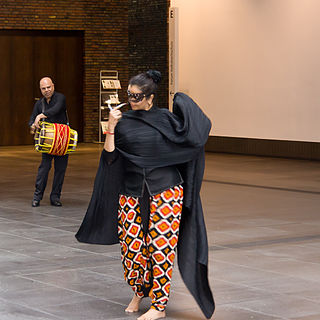
Ramesh Shotham is a percussionist and drummer.
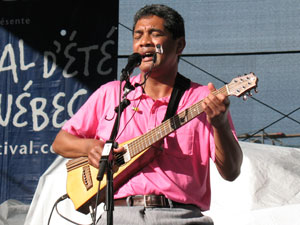
Solo Razafindrakoto known as Solorazaf is a Malagasy guitarist born in France. His roots are both situated in Madagascar. His musical style is very much influenced by these two different cultures and he then created a very personal musical style based on Malagasy traditional music.
Liat Cohen is a Franco-Israeli classical guitarist. Born in Tel Aviv, Cohen is the recipient of concert diplomas and first prizes from the Schola Cantorum de Paris and the Conservatoire de Paris, a laureate of the École Normale de Musique de Paris, and the winner of international competitions in Rome and Paris. Cohen was the first classical guitarist to receive the Nadia and Lili Boulanger Prize awarded by the Foundation of France.
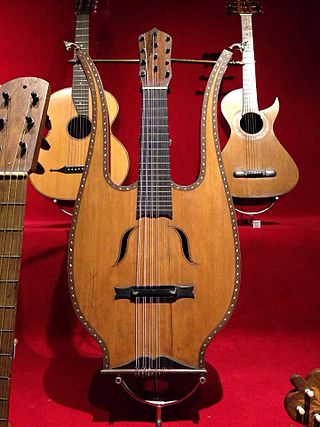
A musical instrument of the chordophone family, the lyre-guitar was a type of guitar shaped to look like a lyre, popular as a fad-instrument in the late 1800s. It had six single courses, with a fretboard located between two curved arms recalling the shape of the ancient Greek kithara. It was tuned and played like the conventional guitar.

Jean Pierre "Matelo" Ferret was a French musette and gypsy jazz guitarist and composer. He was an associate of Django Reinhardt and the youngest brother of guitarists Baro and Sarane Ferret. He recorded with his own sextet in Paris in the 1940s and continued performing there, with occasional recording sessions, until his death in 1989. He was noted for a musical style that incorporated Russian and Hungarian influences and lived long enough to see a resurgence of interest in gypsy jazz in which he was recognised as one of the great surviving players of the genre. Two of his sons, Boulou and Elios Ferré, continue to play a more modern and individualistic form of gypsy jazz-based guitar music in Paris.

Zeid Hamdan is a Lebanese music producer. He was named one of 8 leading lights in Lebanese culture by CNN. He has worked with many leading artists including, Soap Kills, The New Government, Katibe5, Shiftz, Hiba Mansouri, Kanjha Kora, Kazamada, Maryam Saleh, Maii Waleed, Dany Baladi, Zeid and the Wings and recently Marie Abou Khaled, Tanjaret Daghet, Muhammad Abdullah from EL MORRABA3 and Lynn Adib.

Jérémy Jouve is a French classical guitarist. He was one of six Frenchmen to win the Guitar Foundation of America International competition.
Olivier Chassain is a French classical guitarist.

Deleyaman is a French-American musical band founded in Normandy, France in 2000 by the American multi-instrumentalist of Greek-Armenian origins Aret Madilian from Los Angeles, along with French singer Beatrice Valantin and French-Armenian duduk player Gerard Madilian.
The Bibliothèque Orientale is a large research library founded in 1875 by the Jesuits of the Saint Joseph University in Beirut, Lebanon. In 2014, it held more than 225,000 books, 250,000 photographs and various documents in the fields of archaeology, theology, history, geography, philosophy, linguistics, literature and art.

















